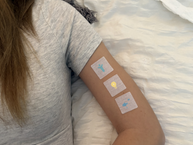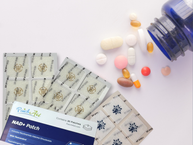By now, you may have heard that not all fats are the same. Less-healthy fats include trans and saturated fats, while healthy fats include unsaturated fats. In particular, omega-3 fats are among the healthiest types, according to a long list of research studies.
Here are 15 potential health benefits of omega-3 fats, followed by how you can get more of them. The Omega-3 Vitamin Patch by PatchAid is a source of short-chain and long-chain omega-3s, and it also has related nutrients and ingredients.* It is easy to use, so ask your healthcare provider if it may be right for you.
Benefits of Omega-3 Fatty Acids
Omega-3 fatty acids come in short-chain and long-chain forms. The short-chain omega-3 fats are alpha-linolenic acid, or ALA. Long-chain omega-3 fats include eicosapentaenoic acid, or EPA, and docosahexaenoic acid, or DHA. Both types may have health benefits.* Here are some of the likely benefits of omega-3 fats.*
Improves heart health. The most common benefit that you may hear about omega-3’s is that they are good for heart health. What does that mean? Well, they are linked to reductions in risk factors. Having more omega-3’s is linked to improvements in total and HDL cholesterol, as well as triglycerides. Blood clots may also be less likely with high consumption of omega-3 fats.
Reduces inflammation. Chronic inflammation is linked to chronic diseases, such as heart disease, cancer, and diabetes. Omega-3 fats are considered anti-inflammatory, and having more of them may be linked to lower levels of inflammation in the body.
Improves mood. Depression is among the most common mental health issues, and it is more common nowadays. Consumption of omega-3s appears to be linked to fewer symptoms of depression, such as sadness, fatigue, and lack of interest.
Supports brain health during aging. Cognitive decline, and conditions such as Alzheimer’s disease, are increasingly likely with age, but having optimal amounts of omega-3’s may lower the risk.
Reduces anxiety. Worrying about some things is good, but too much worry can be debilitating. People who have more omega-3’s regularly tend to have less anxiety.
Supports eye health. Your eyes need omega-3’s to function properly. For one thing, people who eat more omega-3’s tend to have a lower risk for macular degeneration. For another, DHA is part of the structure of your retina, which is part of your eye. A deficiency can impair visual health.
Supports stronger bones. There is some evidence that omega-3’s help your body incorporate calcium into bones, which would make them stronger. This would lower the risk for osteoporosis and bone fractures, though more research is needed to confirm this theory.
Supports skin health. Omega-3 deficiency can lead to scaly, dry skin, while having more omega-3’s may improve the appearance of skin.
Improves joint health. Osteoarthritis is a painful condition that happens when the protective cushioning in joints wears down. Having more omega-3’s may decrease inflammation and interrupt the development of arthritis.
Improves outcomes in pregnancy and post-partum. Omega-3’s are critical in fetal development. Maternal consumption of omega-3’s may lead to improvements in the baby’s visual health, brain development, and overall development.
Getting More Omega-3’s
Do you need more omega-3 fats? If you are like the average American, you can probably do with more. You can get omega-3 fats in foods and supplements. Since some people don’t like the foods that they come in, and oral supplements can have drawbacks, an Omega-3 Vitamin Patch may be your best bet.* Ask your healthcare provider before taking any type of dietary supplement.
Foods that have omega-3’s have either short-chain or long-chain omega-3’s. You can get ALA, a short-chain omega-3, in plant-based foods. Sources include the following.
- Flaxseed and flaxseed oil.
- Walnuts.
- Canola oil.
- Soybeans and soy oil.
Long-chain omega-3’s are in seafood. Greater amounts are in fatty fish, while lean fish and shellfish may have smaller amounts. These are examples of fatty fish.
- Tuna
- Mackerel
- Sardines
- Salmon
- Trout
- Halibut
- Herring
Your body cannot make ALA. And, your body can only convert a limited amount of ALA into EPA and DHA. If you don’t like the above foods, or you follow a vegan diet or avoid seafood, you are likely not getting optimal amounts of omega-3’s. In that case, you might ask your doctor about supplements.
Oral supplements can include fish oil capsules, squeeze gels, gummies, and oil. Drawbacks of these can include a fish aftertaste, as well as the need to swallow them, which can be a barrier if you are not into taking pills. The PatchAid Omega-3 Vitamin Patch has omega-3’s but is not something you need to take by mouth.
The PatchAid Omega-3 Vitamin Patch is a topical patch that delivers nutrients transdermally, or across the skin. These are some of the ingredients and highlights.*
- 1300 mg of omega-3 fatty acids
- ALA, EPA, and DHA
- Astaxanthin, an antioxidant
- Omega-6 fats
- Coenzyme Q10
The PatchAid Omega-3 Vitamin Patch:
- May promote heart, joint, and brain health.*
- May support cell integrity and health.*
- May support normal metabolism.*
- May protect cells from damaging free radicals.*
Just be sure to ask your healthcare provider before using any type of dietary supplement.
The PatchAid Omega-3 Vitamin Patch is easy to use. Just peel off the backing and apply the sticky part to a clean, hairless area of your skin. Leave it on for up to 8 hours while you go about your day or sleep, and then remove and discard it. Repeat the next day with a new patch. Remember, it’s okay to use multiple PatchAid patches at once, as long as your healthcare provider agrees.
Getting enough omega-3’s can have health benefits, and the PatchAid Omega-3 Vitamin Patch is easy to use.* Talk to your healthcare provider about whether it may be right for you.
*The Food and Drug Administration has not evaluated these statements. PatchAid patches are not intended to diagnose, treat, cure or prevent any disease. Anyone with a medical condition should seek the advice of a licensed medical practitioner. Individual results may vary.







